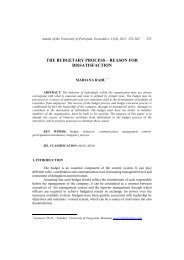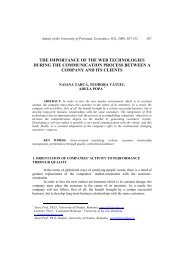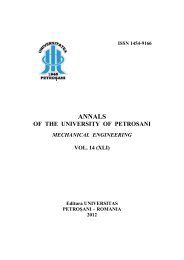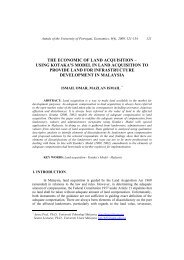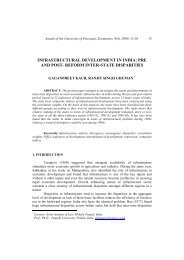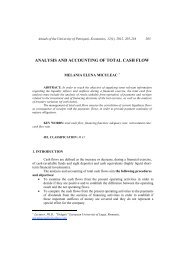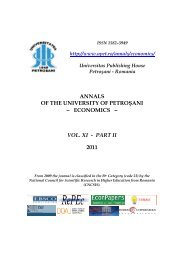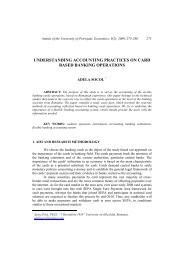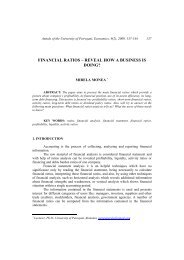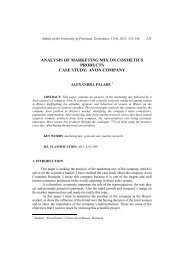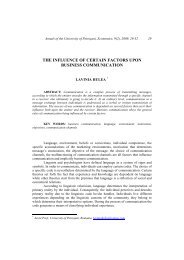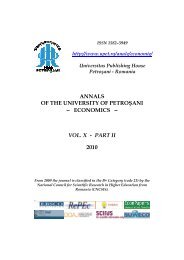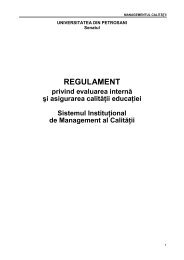annals of the university of petroÅani â¼ economics â¼ vol. xi - part i ...
annals of the university of petroÅani â¼ economics â¼ vol. xi - part i ...
annals of the university of petroÅani â¼ economics â¼ vol. xi - part i ...
You also want an ePaper? Increase the reach of your titles
YUMPU automatically turns print PDFs into web optimized ePapers that Google loves.
232 Răvaş, O.<br />
contracts is problematic as long as state authorities have not established a functioning<br />
legal system, and hence contract enforcement through state authorities cannot be<br />
counted on.<br />
If contract enforcement through state authorities cannot be relied on, trade<br />
<strong>part</strong>ners have to seek o<strong>the</strong>r means <strong>of</strong> protecting <strong>the</strong>ir interests in business transactions.<br />
One possible substitute for formal contracts would be relying on reputation as an<br />
enforcement mechanism.<br />
Trade <strong>part</strong>ners <strong>vol</strong>untarily stick to <strong>the</strong> terms <strong>of</strong> <strong>the</strong> contract if <strong>the</strong> risk <strong>of</strong> losing<br />
<strong>the</strong>ir reputation and <strong>of</strong> not being able to do business in <strong>the</strong> future is a sufficiently large<br />
punishment for misconduct However, <strong>the</strong> extent to which reputation can help as an<br />
enforcement mechanism is limited. In <strong>the</strong> context <strong>of</strong> international trade, Bulow and<br />
Rog<strong>of</strong>f (1989a) have shown that reputation may fail to induce sovereign countries to<br />
repay <strong>the</strong>ir debt. And even if this reputation mechanism sustains some international<br />
trade, firms may look for means to overcome <strong>the</strong> limits set <strong>of</strong> this mechanism. In<br />
transition economies <strong>the</strong> problem is even more conspicuous, since in times <strong>of</strong> historic<br />
change <strong>the</strong> future is uncertain and business <strong>part</strong>ners may not know whe<strong>the</strong>r <strong>the</strong>y or<br />
<strong>the</strong>ir <strong>part</strong>ners will be in business in <strong>the</strong> future for a variety <strong>of</strong> reasons.<br />
Thus, in both environments, trade <strong>part</strong>ners may look for alternative means to<br />
enforce contracts and to sustain <strong>the</strong>ir economic activities. If contract enforcement is<br />
weak, problems may arise on both ends <strong>of</strong> a business transaction: <strong>the</strong> seller may fail to<br />
deliver <strong>the</strong> good, and <strong>the</strong> buyer may fail to pay for <strong>the</strong> goods. If buyers have no cash to<br />
pay, and thus face liquidity constraints at <strong>the</strong> time <strong>of</strong> delivery, <strong>the</strong> business transaction<br />
can take place only if <strong>the</strong> seller can trust <strong>the</strong> buyer to pay in due course. On <strong>the</strong> o<strong>the</strong>r<br />
hand, <strong>the</strong> buyer is willing to engage in a business transaction only if she can trust <strong>the</strong><br />
seller to deliver <strong>the</strong> right goods.<br />
Both problems are prevalent in trade and transition. In each environment,<br />
enforcing <strong>the</strong> payment <strong>of</strong> goods can pose serious problems. In <strong>the</strong> aftermath <strong>of</strong> <strong>the</strong> debt<br />
crisis in <strong>the</strong> 1980s, highly indebted countries were liquidity constrained and could not<br />
finance necessary imports. Given <strong>the</strong>ir level <strong>of</strong> indebtedness, debt repayment could not<br />
be relied on. The debtor country could create more liquidity by not repaying its debt<br />
ra<strong>the</strong>r than receive a new loan. Similarly firms in <strong>the</strong> former Soviet Union are highly<br />
indebted, vis-a-vis each o<strong>the</strong>r, vis-a-vis <strong>the</strong> state and vis-a-vis <strong>the</strong>ir workers. The<br />
phenomenon <strong>of</strong> inter-firm tax and wage arrears exploded in <strong>the</strong> 1990s, making it more<br />
likely that <strong>the</strong>se firms would repudiate on <strong>the</strong>ir payments.<br />
As a conclusion, it is important to underline <strong>the</strong> important role <strong>of</strong> <strong>the</strong> barter<br />
agreement over traditional credit arrangements. The main difference between a<br />
promise <strong>of</strong> future money and a promise <strong>of</strong> future goods is that goods have superior<br />
credit enforcement properties as compared to money.<br />
Acknowledgement<br />
Research within <strong>the</strong> project POSDRU/ CPP107/DMI1.5/S/76851 co-financed<br />
by <strong>the</strong> European Social Fund through <strong>the</strong> Sectoral Operational Programme Human<br />
Resources Development 2007-2013”.



